The dilemma of being a Lankan graduate
Nipuni WIMALAPALA
“There are some visible reasons for unemployment among graduates. I
have gone through many stories during my long working period. I briefly
list out them as follow,” Professor said.
* Skills mismatch
* Impractical academic course units
*Language barriers (lack of competency in English language)
* Internal students vs. external students
* Lack of computer literacy
* Lack of PR and soft skills
* Ego mindset of graduates
* Negative and backward attitudes of graduates
* Lack of competent academic staffs
Year 2012
Admitted to grade 1 350,000
Sat for the G.C.E (O/L) Examination 305,000
Sat for the G.C.E (A/L) Examination 185,000
Disqualified for university admission 135,000
Qualified for University 22,000
After the last semester exam of the final year we were at the exit
doorstep of the university. We had enjoyed a wonderful four years,
dreaming of a fancy job for all our sweat. We all desperately wanted
some earnings. Of course, it is the ultimate outcome of education, as we
thought or rather we are made to think.
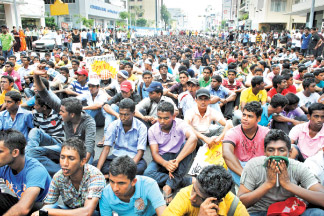
Like all my peers I started applying for jobs even before I got the
results. Though our sole purpose was to start a new life as a
professional, most of us soon understood that our graduation was not the
ticket to enter the showbiz of life.
Many graduates have to go through tremendous difficulties in the
tough competition to fill vacancies both in the public and private
sectors in the modern commercial world.
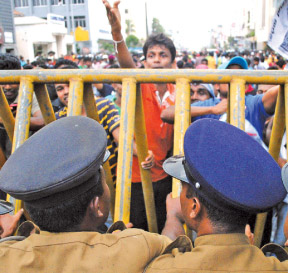
Obviously there are certain strengths one should own apart from
academic achievements. A degree alone would not do in getting the
perfect job or rather their dream job.
"I am fed up with everything now. I never thought I would have to go
through such difficulties to get employed," said Jayani Perera, an arts
graduate of Colombo University, "I had thousands of dreams to become a
professional at a prestigious private institute or in government sector.
I have applied for hundreds of jobs, though most of them do not suit me
or I couldn't get through the interviews of those offers I loved. Now I
feel I wasted years at the university."
|
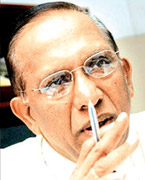
Prof Indralal de Silva |
"I was lucky I got employed even before I leave the university. I was
in the arts faculty and I am talented in writing. So while I was in the
third year, I got a part time employment at an advertising firm as a
creative writer, they loved my work and once I left the university, they
absorbed me on full time basis."
It is the story of another arts graduate, Amali Mallawarachchi.
Aruna Priyadarshana hates the system. "We had a lot of hopes about
our degree. But today nobody cares it and we are unemployed. I passed
out from the university two years ago. But still I am waiting for a job.
I cannot face my poor parents. They had lots of dreams about me. I broke
up with my girl friend, because I cannot even think of getting married.
I have gone for a lot of interviews. But I could not find a suitable
job. My question is, if the government cannot offer us employment, what
is the point of offering arts degrees?"
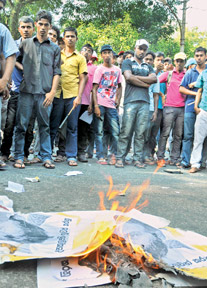
Though thousands of expressions are not mentioned here, these ones
and more importantly real stories of graduates reflect how hard and
painful it is being unemployed and to be a graduate at the same time.
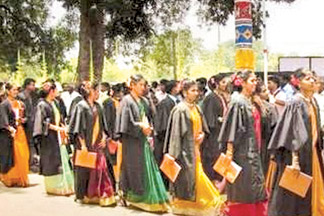
Whatever consequences arise from this situation, it is evident that
to be without a job with a degree in hand is spiky and that is the
reason most unemployed graduates hate the education system.
Former Dean and a Professor in Demography, Faculty of Arts, Colombo
University Prof Indralal de Silva stressed that the unemployment among
graduates is a critical and sensitive topic which should be addressed in
a very effectual manner.
And he also emphasized the importance of increasing graduates'
employability utilizing many effective ways.
Labour force is defined as those persons who are employed or
unemployed during a particular period. In Sri Lanka the period is one
week. According to the statistics of 2011, remaining labour force of the
country is 8.3 million excluding the Northern Province. 5.4 million Of
it are males while the rest, 2.9 million is female. It is projected that
Sri Lanka's labour force in 2016 would be over 9 million. Rate of the
growth of the labour force which indicates as 1.3 is higher than the
population growth, 1.1.
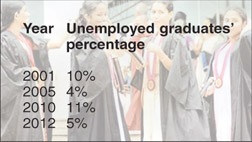
The recent statistics reflect that Sri Lanka has succeeded in
reducing the rate of unemployment to a single digit during the last
decade. It was 4.2 percent of the labour force in 2011 whereas In 2002
it was 8.8 percent. So it is clear that in general Sri Lanka maintains a
considerably low unemployment rate at the moment.
According to Prof. Indralal, when it comes to unemployment among
graduates, there are some visible changes in the percentage which differ
from year to year. Graduate unemployment is indicated during the last
decade as below.
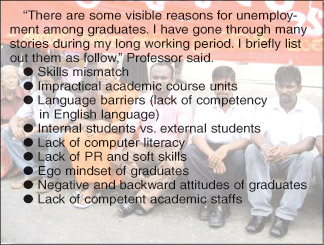
The urgent thirst for more jobs was well quenched by the government
with the introduction of bulk graduate recruitment and as a result there
was a very clear reduction of graduate unemployment in 2005 and 2012 as
the figures show.
Professor argues that even though it is effective when government
recruits graduates, it would be more productive if graduates are more
competent in their academic discipline to attract a demand from the job
market. The fact implies the necessity for amendments and restructuring
of the whole higher education disciplines to improve the standards of
their outcome who possess the required skills and qualification to suit
the modern day job industry. So graduates do not have to depend on the
government to get employed.
To overcome above barriers, there are many procedures to be taken by
all the stake holders that involve in higher education including our
plot, the undergraduates. "Internal students vs. external students is a
critical issue. The reason is though finally both categories are
graduates; there is a huge difference between the qualities of their
degrees. Internal students of course fully dedicated to the academic
process during 3 or 4 years where as external students most probably do
it on part time basis. So the gap between them is high. But
unfortunately all of them finally fall into the same so called
unemployed graduates' category and the government has to take care of
all in terms of recruiting" Prof. Indralal stressed.
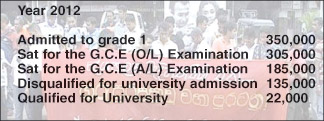
Above mentioned issue often takes place in arts faculty and mostly
unemployment is reported among graduates of social sciences and
humanities or arts. Engineering, medical, dental, IT, commerce and most
of the science students do not face this issue.
To put an end to the problem is not an easy task, battles are never
won over night, but still there are tactics and solutions that we can
apply and put them into practice. Prof. Indralal suggests of some
important variations to the current flow in order to reduce graduate
unemployment.
Basically changes have to be made within the university system. There
should be cooperation among local universities. Since the education set
up of universities differs from each other, those which are deprived of
facilities and resources both human and physical and newly established
ones must be supported by well established ones. Professor suggested
that the academic staffs have to be well qualified and competent
possessing the ability to resist politicization within the university.
All the course units have to be taught in a practical approach. Student
exchange progarmmes should be launched to give an international exposure
to the students. Language competency should be improved by giving
maximum prominence to English medium instructions. Students should be
encouraged to do more research related activates and assignments which
will bring productive outcomes.
"Apart from them, improving computer literacy, offering computer
studies in a compulsory manner among undergraduates is very important.
Assignment submission, course works, handouts and other communication
matters between the lecturer and the student have to be done via
internet. Computer and English literacy should be a stressed matter till
students can make them as main stream," he noted.
National Youth Services Council Chairman Lalith Pium Perera also
stressed the importance of improving employability among graduates
utilizing the available resources. "There are many reasons that cause
unemployment of graduates. Most of them arise as a result of the
remaining deficiencies of the higher education system. The main reason
is the issue of external graduates. They also fall into the same
category though there is a gap between internals and externals.
Practically the government finds it difficult to recruit all of them.
Attached to NYSC, there is a university called, Yowun Sarasawi through
which a lot of youths get graduated. 85 percent of our students are arts
graduates" Perera stressed.
The NYSC chairman expressing his ideas on how youth from outskirts go
for a degree said that most of the rural parents and students believe
that being graduated in whatever form means everything and they do not
have an idea about the best academic discipline for which demand is
generated from the employers, and how practical the their degree will be
when they go to society.
So the main thing is to change the mindset of the graduates
convincing them that they have to be more concerned about discipline.
Students should be encouraged to be alert on local and international
trends in education and employment sector without being framed into
stereotyped academic processes.
"Rapidly developing countries like, Singapore, Thailand, Malaysia,
India are adopting to the international standards of education so
students can access modern trends to the commercial world as
professionals. So we are lucky to have free education which of course in
other countries are not so and it is a mega achievement, why can't we
adopt new trends to suit us, is my argument. Arts graduate is an asset
to the development of the country. But he has to have more potential.
Attitudinal change is vital to make an effective impact on graduates.
Being a main part of the Skills Development and Youth Affairs Ministry,
we do contribute much to uplift the youth graduates' status which will
in turn help them to be employed easily" he further stated. |



